Related Research Articles

Barber–Scotia College is a private unaccredited historically black college in Concord, North Carolina. It began as a seminary in 1867 before becoming a college in 1916. It is affiliated with the Presbyterian Church (USA).
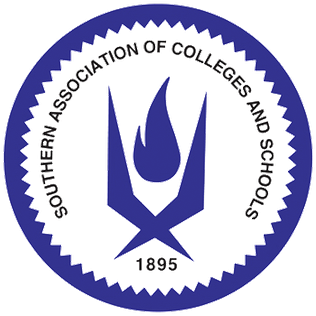
The Southern Association of Colleges and Schools (SACS) is a regional educational accreditor recognized by the United States Department of Education and the Council for Higher Education Accreditation. As of 2022, the organization oversees approx. 750 public and private degree-granting educational institutions in the Southern United States. Its headquarters are in North Druid Hills, Georgia, near Decatur, in the Atlanta metropolitan area.

Southern Virginia University (SVU) is a private liberal arts college in Buena Vista, Virginia. The college, though not officially affiliated with a particular faith, embraces the values of the Church of Jesus Christ of Latter-day Saints. It was founded in 1867 as a school for girls and is now a private four-year coeducational institution. The Carnegie Classification categorizes it as a very small baccalaureate-only college with an arts & sciences focus.

James Lawson Kemper was an American lawyer, a Confederate general in the American Civil War, and the 37th Governor of Virginia. He was the youngest brigade commander and only non-professional general officer in the division that led Pickett's Charge, during which he was severely wounded.

Louisburg College is a private Methodist-affiliated two-year college in Louisburg, North Carolina.
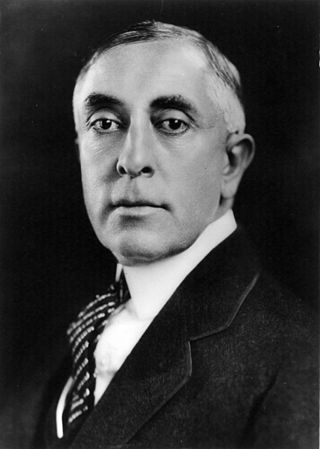
Campbell Bascom Slemp was an American Republican politician. He was a six-time United States congressman from Virginia's 9th congressional district from 1907 to 1923 and served as the presidential secretary to President Calvin Coolidge. As a philanthropist, Slemp set up the "Slemp Foundation", which provides gifts and scholarships to schools and colleges in Southwestern Virginia.

The Norfolk Southern Railway was the final name of a railroad that ran from Norfolk, Virginia, southwest and west to Charlotte, North Carolina. It was acquired by the Southern Railway in 1974, which merged with the Norfolk and Western Railway in 1982 to form the current Norfolk Southern Railway.

The Divinity School at Duke University in Durham, North Carolina, is one of ten graduate or professional schools within Duke University. It is also one of thirteen seminaries founded and supported by the United Methodist Church. It has 39 regular rank faculty and 15 joint, secondary or adjunct faculty, and, as of 2017, an enrollment of 543 full-time equivalent students. The current dean of the Divinity School is the Rev. Dr. Edgardo Colón-Emeric, who assumed the deanship on August 31, 2021. Former deans include the prominent New Testament scholar Richard B. Hays, who stepped down in 2015.
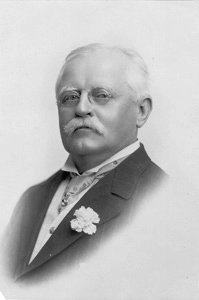
Julian Shakespeare Carr was an American industrialist, philanthropist, and white supremacist. He is the namesake of the town of Carrboro, North Carolina.
The following is a timeline of women's colleges in the United States. These are institutions of higher education in the United States whose student population comprises exclusively, or almost exclusively, women. They are often liberal arts colleges. There are approximately 35 active women's colleges in the U.S. as of 2021.
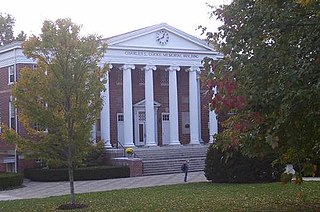
Women's colleges in the Southern United States refers to undergraduate, bachelor's degree–granting institutions, often liberal arts colleges, whose student populations consist exclusively or almost exclusively of women, located in the Southern United States. Many started first as girls' seminaries or academies. Salem College is the oldest female educational institution in the South and Wesleyan College is the first that was established specifically as a college for women, closely followed by Judson College in 1838. Some schools, such as Salem College, offer coeducational courses at the graduate level.
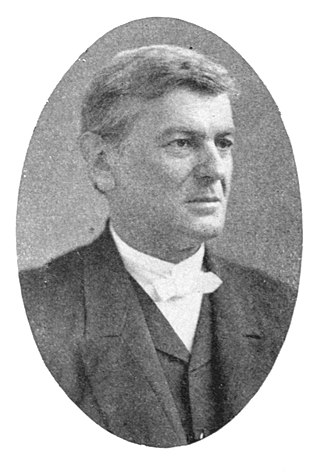
Joseph Ruggles Wilson Sr. was a prominent American Presbyterian theologian and father of President Woodrow Wilson, Nashville Banner editor Joseph Ruggles Wilson Jr., and Anne E. Wilson Howe. In 1861, as pastor of First Presbyterian Church in Augusta, Georgia, he organized the General Assembly of the newly formed Presbyterian Church in the United States, known as the Southern Presbyterian Church, and served as its clerk for 37 years.

Roy Kinneer Patteson Jr. was an American scholar whose knowledge of Biblical Hebrew, Aramaic, Syriac and Hellenistic Greek enabled him to undertake an analysis of the text of the Ben Sira Scroll discovered at Masada in Palestine in 1964. His research resulted in the establishment of a critical Hebrew text for portions of the Book of Sirach, which dates to the first century BC.

The 1932 United States presidential election in Virginia took place on November 8, 1932. Voters chose eleven representatives, or electors to the Electoral College, who voted for president and vice president.

Charles DeWitt Watts was an African-American surgeon and activist for the poor. Watts was the first surgeon of African-American ancestry in North Carolina. Earning his medical degree in 1943 from Howard University College, he was the first African-American board-certified surgeon to serve in North Carolina. After surgical training at Freedman's Hospital in Washington, D.C., in 1949, he moved to Durham, North Carolina, in 1950 and established a clinic to provide access to medical services for the poor. Breaking the social customs of racial obstacles, he advocated for certification of African-American medical students. He also became a member of many professional colleges including the National Academy of Science's Institute of Medicine and the American College of Surgeons. He served as chief of surgery at Durham's Lincoln Hospital and was later one of the key figures in converting it to the Lincoln Community Health Center, a low-priced clinic for the poor.
Frank Harris Vest, Jr. was the eighth bishop of the Episcopal Diocese of Southern Virginia, serving from 1991 to 1998.

The 1936 United States presidential election in North Carolina took place on November 3, 1936, as part of the 1936 United States presidential election. North Carolina voters chose 13 representatives, or electors, to the Electoral College, who voted for president and vice president.

The 1932 United States presidential election in North Carolina took place on November 8, 1932, as part of the 1932 United States presidential election. North Carolina voters chose thirteen representatives, or electors, to the Electoral College, who voted for president and vice president.

The 1928 United States presidential election in North Carolina was held on November 6, 1928. North Carolina voters chose twelve electors to the Electoral College, who voted for president and vice president.

Immanuel Lutheran College was an educational institution of the Evangelical Lutheran Synodical Conference of North America whose main purpose was to train Black men to be pastors and both men and women to be teachers. It was founded in Concord, North Carolina, in 1903 and relocated to Greensboro, North Carolina, in 1905. The college was closed in 1961 when the Synodical Conference decided that the training of Blacks should be integrated into the educational institutions of the Lutheran Church–Missouri Synod (LCMS), the largest member of the conference. The former campus was purchased by North Carolina A&T State University.
References
- 1 2 3 4 5 6 7 8 9 10 11 12 13 Colebaugh, Lucy Southall (2015). "Robert Lee Durham (4 May 1870–1 January 1949)". Dictionary of Virginia Biography. Library of Virginia. Retrieved June 22, 2020.
- 1 2 3 4 5 6 7 8 9 10 11 Hunt, William Allen (2011). A lifetime of change: Robert Lee Durham and the New South (Master's Thesis). Iowa State University.
- ↑ Duke University (1949). The Alumni Register... p. 7.
- 1 2 "Southern Sem College Store" . Retrieved June 23, 2020.
- ↑ Walch, Tad (June 19, 2020). "Southern Virginia University removes white supremacist's name from building at school for Latter-day Saints". Deseret News. Retrieved June 24, 2020.